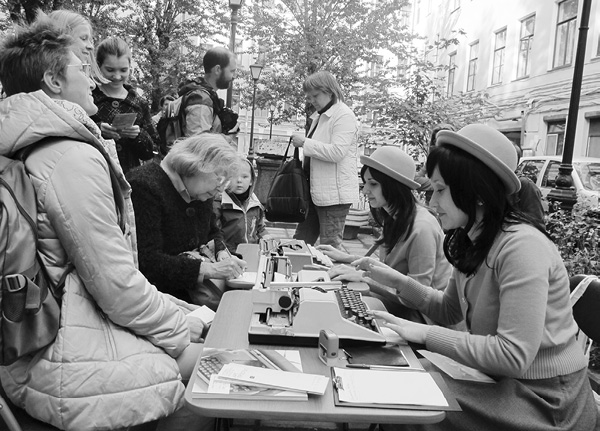
ROLE MODEL
first performed on September 20, 2012
Art Prospect, St. Petersburg, Russia
performed three times in 2012
SHERYL ORING
Greensboro, NC
651658132o651658132r651658132i651658132n651658132g651658132@651658132i651658132w651658132i651658132s651658132h651658132t651658132o651658132s651658132a651658132y651658132.651658132o651658132r651658132g
iwishtosay.org
ROLE MODEL
SHERYL ORING
On a practical level, the project was developed after I was invited to present work at the first Art Prospect festival in St. Petersburg, Russia. The festival, a collaboration between Art in Odd Places founder Ed Woodham and the CEC ArtsLink organization, was organized around the theme of “model.” I decided to set up a public office with two typists and invite passersby to answer the question: “What can Russia teach the world?”
Conceptually, however, the idea for this work grew out of my experience of living in Berlin, of living outside my native culture in a place where not everything made sense. It was often disconcerting to not know the social codes and expectations. And often liberating as well.
There’s so much talk about “globalization” and yet so many people in the US haven’t had the good fortune to experience life in a different culture. I see this work as a way of exploring alternate ways of life, of thinking, of being and bringing these thoughts and ideas back home to the US to share. When I started thinking about doing the “Role Model” project, I did a little qualitative research on the idea. In other words, I talked to people. One of them was an art historian originally from St. Petersburg, but whom I know from my life in San Diego. She thought people in St. Petersburg would have lots to say in answer to the question.
“They will go on and on,” she said. “They’ll want to tell you so many things.” With her encouragement, I finalized plans for the show.
Then two nights before the premiere, I met an anthropologist in St. Petersburg. She shook her head and looked serious. “There are so many Russians, that if you asked me that question, I would have no idea how to answer,” she said. Luckily the art historian’s impulses were correct and people did want to participate. “Russia can teach the world how to be sad,” said one participant. “Russia can teach the world flexibility, both in the positive and negative sense. Flexibility toward the law, for example,” said another woman. And finally, “Russians have a phenomenally long memory. What Russia can teach the world is how to remember pain and suffering with a certain amount of grace.” The project will continue, with the next show at Encuentro 2013 in São Paolo, Brazil.